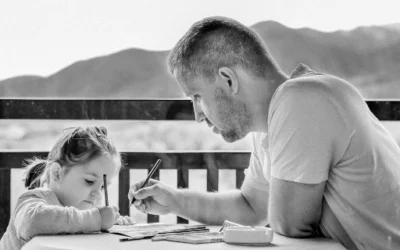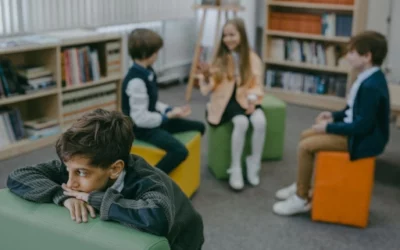Social media has become a regular and significant part of daily life, especially for teenagers. Social media platforms provide ways for people to connect, express themselves, and entertain. Additionally, many jobs now incorporate using some forms of social media.
But like all forms of technology, social media can have a positive and negative influence. For instance, social media can be a way for isolated, shy, or marginalized teens to connect with like-minded peers. But, social media can also expose teens to issues like cyberbullying, leading to concerns about the potential negative effects of social media use on teenager’s mental health.
To help, we explore the potential pros and cons of social media use on teens’ well-being and ways parents can teach teens to use social media responsibly.
What is social media?
Social media refers to applications and online platforms that let users create, share, and interact with content and each other. Some popular platforms young people use include Instagram, TikTok, Snapchat, and YouTube. These online platforms often encourage communication, information sharing, and community building — influencing how people connect and engage.
Understanding social media’s role in teens’ lives
Social media has become a primary mode of social interaction and communication for teenagers. They use social media to connect with friends, express themselves creatively, and share ideas.
It provides them with a platform to build and maintain social relationships, especially in a digital age where face-to-face interaction may be limited. However, the impact of social media on teens’ mental health is a growing concern, especially for parents.
The rise of social media among teenagers
Over the years, the popularity of social media platforms among teenagers has skyrocketed. A 2022 survey by the Pew Research Center found that up to 95% of teenagers report using social media, with 54% of teens saying it would be hard to give social media up [1]. This widespread usage has raised concerns about its potential impact on youth mental health.
How social media platforms engage teens
Social media platforms use various strategies to keep teens engaged, such as personalized recommendations, notifications, and interactive features.
Additionally, these platforms evolve to adjust to the ever-changing preferences and behaviors of young users. They provide a wide range of content, from entertainment to educational resources, which can be easily accessed and shared. Understanding how social media platforms engage teens is crucial in assessing their impact on mental health and well-being.
Does social media impact teenagers’ mental health?
The possible effects of social media on teens’ mental health is complex. Research is mixed, with studies showing both positive and negative effects [2].
But, parents will also need to consider factors like how teens use the technology and how frequently. For instance, a 2018 study on Canadian adolescents focused on problematic social media use (such as signs of possible social media addiction) instead of social media use in general [3]. This study found that teens identifying as having problematic social media use and those at moderate risk were more likely to report emotional problems and lower life satisfaction.
These results help highlight the importance of helping teens learn how to use social media responsibly so they develop a healthy balance between virtual and real-life interactions.
Potential benefits of social media by teens
While there is growing concern about teen social media use, it does have positive impacts on teens. Here are some possible benefits of using social media.
Create social connections
Social media allows teens to stay in touch with friends and family, fostering a sense of belonging and community. Social media can help teens maintain long-distance friendships and connect with peers with similar interests.
These connections can be particularly helpful for shy, marginalized, or isolated teens, who may struggle to build an in-person social support network.
Opportunities for self-expression
Many teens use social media to express themselves creatively through posts, stories, and videos. This can enhance their sense of identity and boost self-esteem as they receive positive feedback and support from their online communities.
Additionally, some teens may use social media as a way to develop and showcase skills for future jobs or to build connections within an industry.
Access to support networks
Online communities and support groups can be a valuable resource for teens facing challenges such as mental health issues, bullying, or other personal struggles. These social network groups can provide a sense of belonging, helping teens not feel alone, and provide advice and encouragement from peers and mentors.
Access to educational resources and inspiration
Social media provides a vast amount of information and inspiration. Teens can follow educational accounts, join study groups, and access resources to foster their academic and personal growth. Many use social media to stay informed about current events and social issues, fostering a more informed and engaged perspective.
Develop digital skills
Digital tools and social media are now a part of life. Engaging with social media now can help teens develop valuable skills such as digital literacy, communication, and networking. These skills are increasingly important in the modern workforce and can provide a head start in their future careers.
Potential risks of social media by teens
As with most technology use, social media can also have adverse effects. Understanding the potential risks can help parents develop strategies to offset the negative impacts and promote healthy social media use.
Here are some potential downsides of social media.
Cyberbullying and harassment
One of the most significant risks to teens’ mental health associated with social media is cyberbullying. Cyberbullying occurs when people use technology like social media to harass, intimidate, or cause harm to others.
These negative interactions, harassment, and bullying can have severe consequences on a teen’s mental health, leading to anxiety, depression, and even suicidal thoughts. Teens targeted by cyberbullying are at a higher risk of mental health issues. They also may experience feelings of social isolation, helplessness, and shame that make it hard for them to reach out for help.
Unrealistic comparisons and body image issues
Social media often presents a filtered and curated version of reality. This viewpoint can lead to teens making unrealistic comparisons. Teens also may feel inadequate or develop body image issues when they compare themselves to the seemingly perfect lives and appearances of others online.
Studies have indicated that social media users report more body-related image concerns than non-users, especially among girls [4]. Social media use and messages may also influence gender norms and practices, negatively impacting teens’ self-worth, attitudes, and well-being.
Poor time management, sleep disruptions, and distractibility in the classroom
Social media can be highly addictive, leading some teens to spend too much time online. This can interfere with their academic performance, physical health, real-life social interactions, and disrupt sleep patterns. Their focus on social media can cause them to get behind on school work, making it hard for them to balance what they need to do and use effective time management strategies.
Additionally, many teachers and parents have voiced concerns about students becoming distracted by social media at school, negatively impacting their learning. These concerns have led some school districts to make changes. For instance, Ontario has passed new standardized province wide restrictions on cell phones, mobile devices, and social media use in schools starting in September 2024 [5]. As part of the new policy, social media sites will be banned on all school networks and devices.
Exposure to inappropriate content
Despite efforts to regulate content, teens can still be exposed to inappropriate or harmful content, including violence, explicit material, and misinformation. This can impact their mental well-being and shape their perceptions in negative ways.
Privacy and security concerns
Teens may not always understand the potential privacy and security risks that can occur when using social media. They may not be as careful about how and when they share personal information online. As a result, they may be at increased risk of issues like identity theft, privacy breaches, and unwanted contact from strangers.
Identifying signs of unhealthy social media use to help your teen
Social media is a part of your teen’s world and likely will be throughout their life. But, one way you can help support your teen is by being mindful of possible signs of unhealthy social media use.
Some common signs of unhealthy social media use include changes in mood and behaviour, such as:
- Spending too much time on social media
- Increased feelings of envy, insecurity, or low self-esteem associated with social media use
- Withdrawing from real-life interactions or activities they normally engage in
- Need to check social media for updates or notifications
- Not keeping up with homework or other obligations due to time spent on social media
- Poor sleep because staying up late on social media or waking up to check on notifications
If you’re concerned about your teen’s social media use, it’s important to have an open and honest conversation with them. Together, you can explore the concerns and healthy ways to help your teen overcome any situational or emotional challenges related to their social media use. If they continue to struggle, your teen may benefit from talking with a professional therapist.
How parents can help their teen use social media responsibly
As their parent, you can help your teen create healthy habits when using social media. So they understand the possible risks and benefits of social media and can feel confident in their use of social media now and in the future.
Here are some ways to help your teen use social media in a positive manner.
1. Talk with your teen about the pros and cons of social media.
Your teen can learn to use social media wisely by understanding the benefits and risks. Talk openly and without judgment about the benefits and risks of social media. Engage your teen in a discussion, listening to their concerns and views. Understanding both sides can help your teen make informed decisions and develop a balanced, healthy approach when using social media. It also may make them more open to talking with you if they have concerns.
2. Set clear expectations on social media use.
As a parent, you can set boundaries and expectations for your teen’s social media use, even if they contribute towards paying for their device or internet usage.
Explain to them the reasons for any rules or expectations you’re setting. But it’s also important to listen to your teen when discussing your expectations. For instance, you may set the rule that your teen can’t use social media until their school work is done. However, your teen may have a group chat with classmates specifically to work on projects. Having an open discussion can help you work with your teen to set up appropriate boundaries and help ensure they will follow your expectations.
Some rules or limits may include:
- Putting devices out of your teen’s bedroom before going to bed to reduce the risk of poor sleep.
- Not using devices during meals so family members have time to talk together.
- Having certain chores or activities completed before using social media.
3. Promote a safe online environment.
Promoting a safe online environment is essential to protect the mental well-being of teens. Parents can help by staying aware of their teen’s social media use and interactions and talking with their teen about cyberbullying and what to do if they are targeted.
Additionally, discuss with your teen how to:
- Critically evaluate the content they encounter online.
- Question the authenticity of online information and recognize possible biased sources or manipulated images.
- Set up secure passwords.
- Identify potential online scams.
4. Chat with your teen about what they’re doing on social media.
Periodically talk with your teen about what social media platforms they’re using and who they’re chatting with. If your teen uses YouTube, you’ll also want to talk with them about what YouTube channels they’re watching and what they’re learning.
Be open and genuinely interested to reduce the risk of making your teen feel defensive. This is a good opportunity for you to further connect with your teen — learn about their interests and what’s going on in their life.
If you have some concerns, be honest. However, listen openly and without judgment. These conversations can also be an opportunity for them to talk with you if they are experiencing a problem or difficult situation.
5. Be thoughtful about how you discuss concerns about your teen’s social media use.
Promote open communication without fear of judgment to help your teen feel comfortable about discussing their online experiences with you. Let them know that mistakes can happen and that you’re there to help them problem-solve and navigate any challenges that arise.
6. Encourage your child or teen to spend time with friends in real life
While social media can be a great way for kids to connect, children and teens still need to interact with their friends face-to-face. In-person interactions help kids further develop their social skills, build meaningful relationships, and feel a sense of belonging.
Talk with your child or teen to identify additional ways you can help them meet up with friends in-person, such as arranging get togethers or attending after school programs.
Sources
- Pew Research Center (April 24, 2023). Teens and social media: Key findings from Pew Research Center surveys. https://www.pewresearch.org/short-reads/2023/04/24/teens-and-social-media-key-findings-from-pew-research-center-surveys/ (Accessed May 2024)
- Khalaf, A. M., Alubied, A. A., Khalaf, A. M., & Rifaey, A. A. (2023). The Impact of Social Media on the Mental Health of Adolescents and Young Adults: A Systematic Review. Cureus, 15(8), e42990. https://www.ncbi.nlm.nih.gov/pmc/articles/PMC10476631/ (Accessed May 2024)
- Health Behaviour of School-aged CHildren (HBSC) Study (2018). Mental Health and Problematic Social Media Use in Canadian Adolescents. https://www.canada.ca/content/dam/phac-aspc/documents/services/publications/science-research-data/mental-health-problematic-social-media-use-canadian-adolescents/mental-health-social-media-use-canadian-adolescents.pdf (Accessed May 2024)
- Wong, Jessica (April 26, 2024). Social media hurts girls’ mental health and education potential, says UNESCO report. https://www.cbc.ca/news/unesco-gem-technology-social-media-1.7184717 (Accessed May 2024)
- Education (April 28, 2024). Ontario cracking down on cellphone use and banning vaping in schools. https://news.ontario.ca/en/backgrounder/1004500/ontario-cracking-down-on-cellphone-use-and-banning-vaping-in-schools (Accessed May 2024)








